Key takeaways:
- Encryption significantly enhances data security, providing a vital barrier against cyber threats and fostering a sense of control over personal information.
- It acts as a first line of defense against identity theft and cyberattacks, reinforcing trust in digital interactions.
- Implementing strong encryption practices, such as using complex passwords and updating protocols regularly, is crucial for protecting sensitive data effectively.
- Encryption not only safeguards data but also aids in regulatory compliance, optimizing efficiency in operations related to data management.
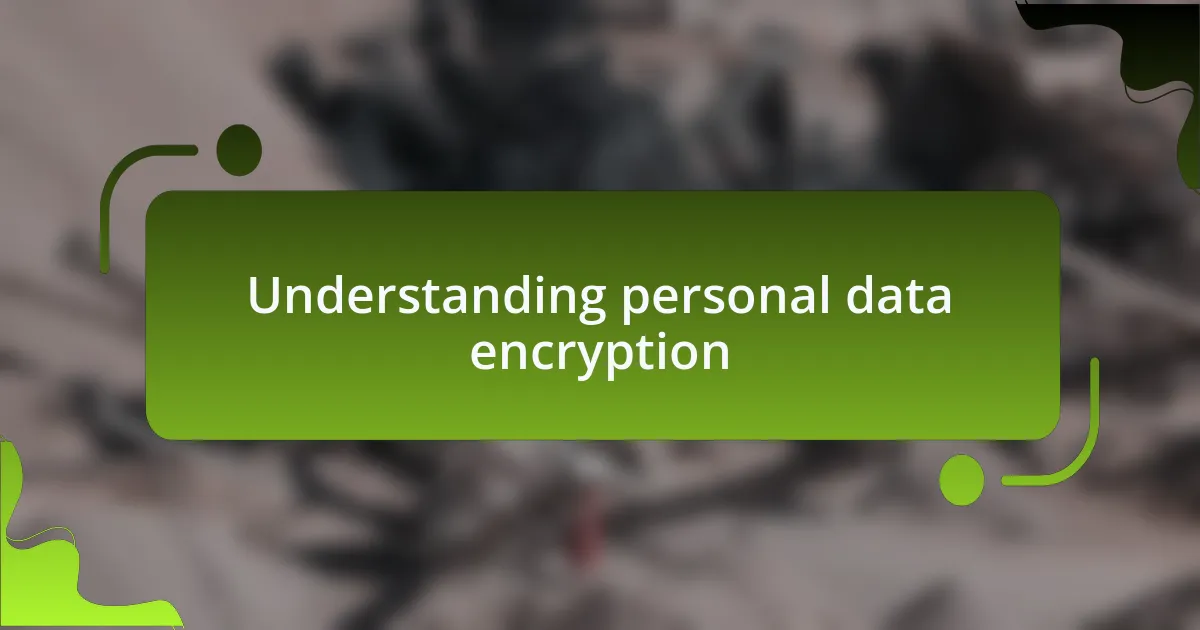
Understanding personal data encryption
When it comes to personal data encryption, I often think of it as the digital equivalent of locking your valuables in a safe. Just as a thief might pry open a poorly secured safe, cybercriminals can easily access unencrypted data. Have you ever wondered how many times your information might have been exposed?
Encryption transforms your data into a code, only decipherable by those with the correct key. I remember the first time I implemented encryption on my own devices; it felt empowering. I realized that in a world where data breaches are common, taking steps to protect my personal information wasn’t just prudent but essential for peace of mind.
It’s crucial to understand that encryption isn’t a full-proof solution, but it significantly enhances your data’s security. I often tell friends that while we can never eliminate risk entirely, encrypting our data is a vital barrier against potential threats. How often do we think about the layers of protection we need in our digital lives? By taking encryption seriously, we can better safeguard what matters most to us.
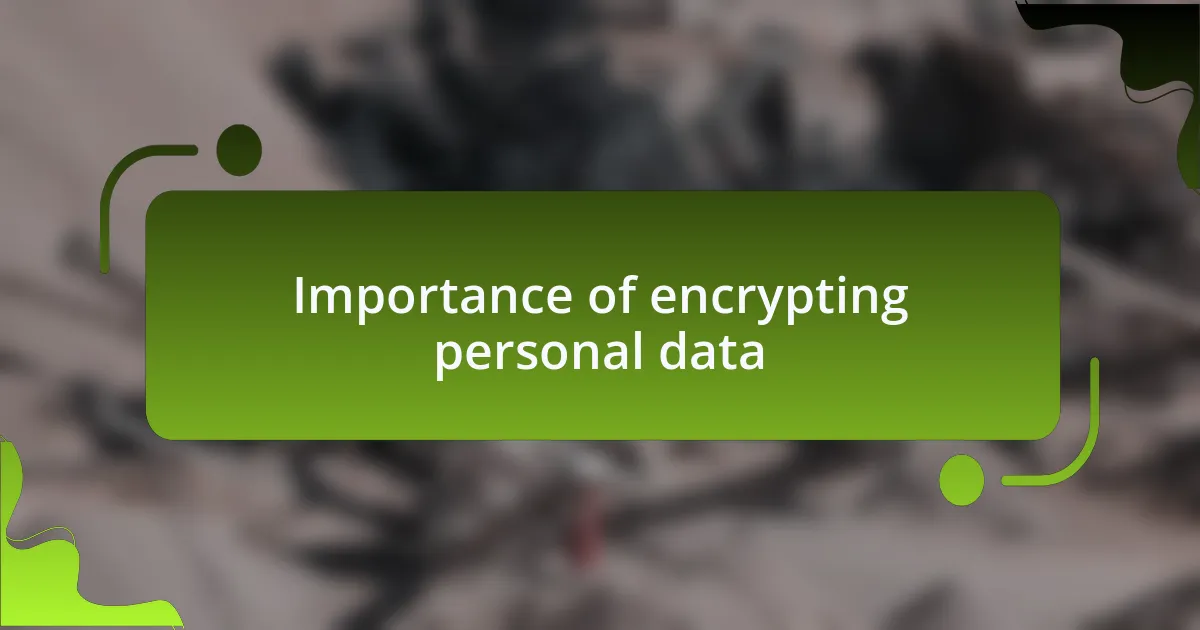
Importance of encrypting personal data
One of the most remarkable aspects of encrypting personal data is how it instills a sense of control in an otherwise chaotic digital landscape. I recall a time when I experienced a minor breach; my heart raced as I pondered what information could be out there. After that incident, I made it a point to encrypt everything, realizing that even a little precaution could mean the difference between security and vulnerability.
Encryption is essentially your personal guardian in the vast world of online information sharing. It’s fascinating to see how it turns your sensitive data into a complex jumble that is nearly impossible for unauthorized users to decipher. Whenever I share sensitive documents with clients or friends, I feel a wave of relief knowing that even if they are intercepted, those snoopers will see nothing but gibberish.
Moreover, in this age of identity theft and cyberattacks, encrypting personal data acts as a robust first line of defense. I often share with my colleagues that it’s not just about locking away your information; it’s about building a strong foundation of trust. Have you considered how encryption not only protects you but also reassures those you interact with online? It’s an essential step in cultivating a secure digital relationship.

Overview of crypto mining platforms
Crypto mining platforms have gained significant attention for their role in validating transactions and securing networks across various cryptocurrencies. I remember my first encounter with a mining platform; I was amazed by the intricate processes involved in breaking down complex algorithms to earn digital currency. The idea of contributing to a decentralized network while potentially earning assets was exciting and opened my eyes to the world of blockchain technology.
These platforms operate by utilizing computational power to solve rigorous mathematical problems, an endeavor requiring both hardware and software efficiency. I think it’s crucial for newcomers to understand that success in mining depends not just on technical knowledge but also on choosing the right platform that aligns with both their investment and risk appetite. Have you ever wondered how some miners maximize their profits while others struggle? It often boils down to intelligent platform selection and continuous learning in this rapidly evolving space.
Additionally, the evolution of mining has changed dramatically with the introduction of cloud mining options, which allow users to rent mining power without the need for extensive hardware setups. This shift opened the door for many individuals who may not have the resources or technical expertise to start mining on their own. It’s a fascinating time to be involved in crypto mining—each day brings new opportunities for growth and innovation.
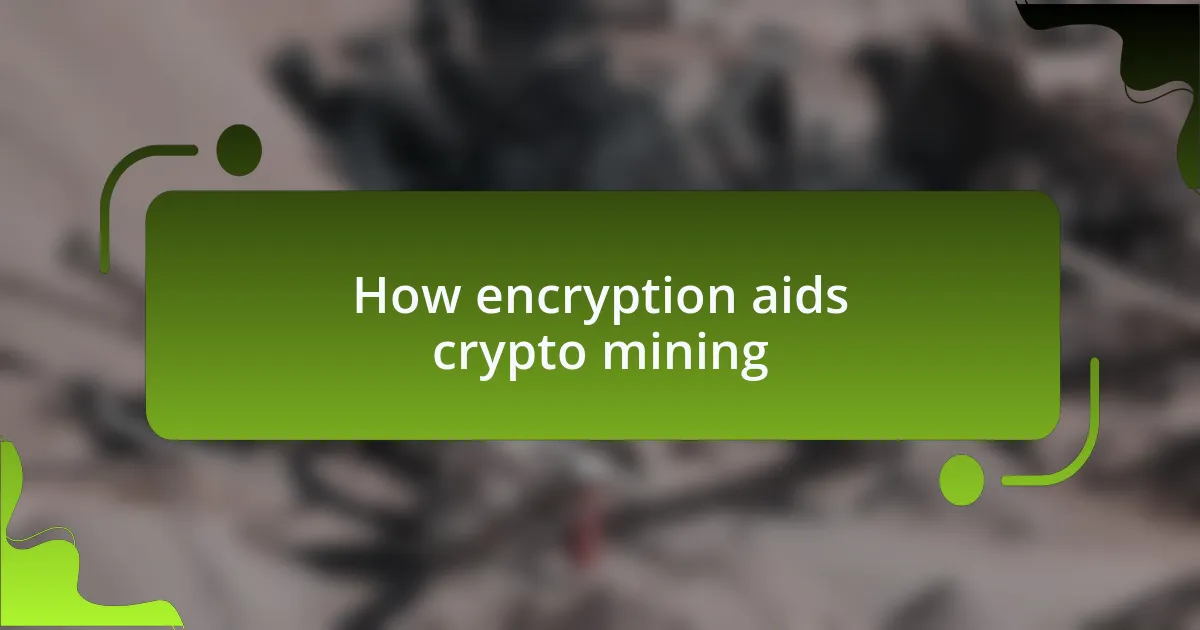
How encryption aids crypto mining
Encryption plays a vital role in the realm of crypto mining, enhancing both security and efficiency. I remember the first time I realized how encryption not only protects miners’ sensitive data but also safeguards the integrity of transactions on the blockchain. Without such encryption, would the trust that underpins cryptocurrencies even exist?
When miners encrypt their data, they create a shield against malicious attacks and hacks that could compromise their operations. I’ve seen firsthand how a breach can not only disrupt mining activities but also lead to significant financial losses. It made me appreciate the value of robust encryption protocols; they truly act as a lifeline in the turbulent waters of the crypto space.
Furthermore, encryption aids in maintaining the anonymity of miners, allowing them to operate without constantly worrying about their identities. This anonymity is empowering; it gives miners the freedom to engage in their activities without fear of reprisal. Isn’t it interesting how such a fundamental concept can forge a sense of community and collaboration among individuals who are often working independently? It’s this blend of security and connectivity that strengthens the entire crypto ecosystem.
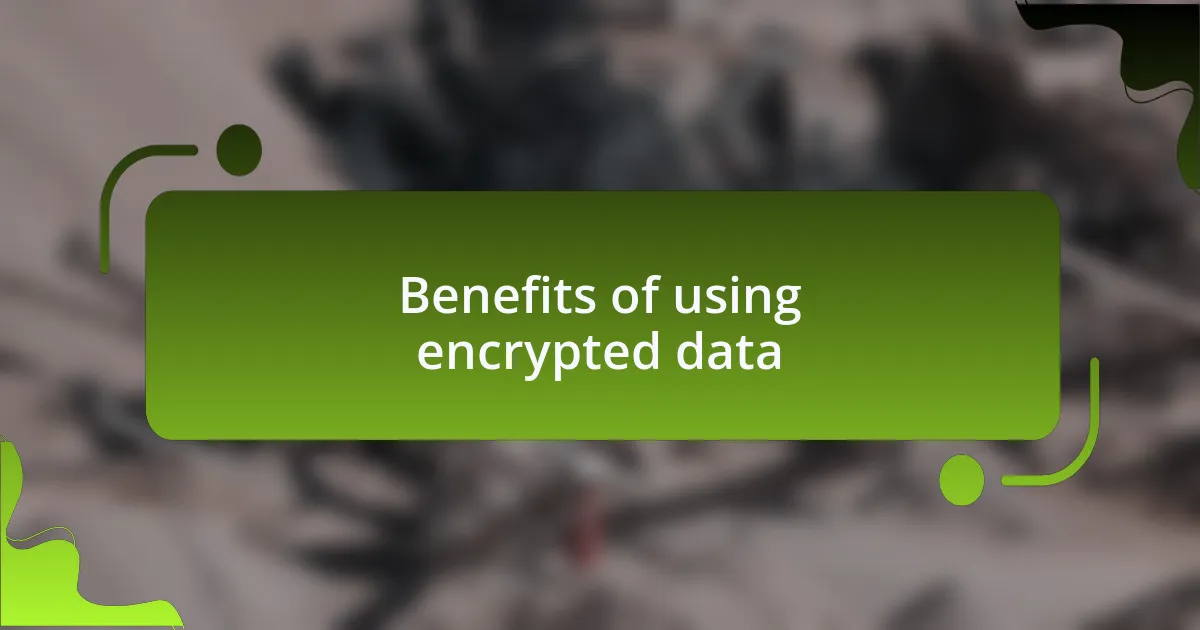
Benefits of using encrypted data
When I think about the benefits of using encrypted data, the first thing that strikes me is the peace of mind it brings. Just last year, I experienced a situation where a friend’s mining operation was targeted by hackers. They lost crucial data because they hadn’t implemented strong encryption. This incident reinforced my belief that encryption acts like a digital fortress, helping to protect not just data but also the entire mining operation from potential threats.
Another significant advantage of encrypted data is its role in regulatory compliance. In today’s world, data privacy laws are becoming stricter, and I’ve found that encryption can ease the burden of adhering to these regulations. With proper encryption in place, miners can confidently ensure that they are protecting sensitive information, thus reducing the risk of hefty fines and legal complications. Isn’t it reassuring to know that by encrypting data, not only do we protect ourselves, but we also stay aligned with the law?
Additionally, the efficiency gains from encrypting data shouldn’t be overlooked. When I implemented encryption in my own minor operations, I noticed that it optimized our data management processes. It streamlined everything from transaction verification to information sharing, allowing for smoother operations overall. Isn’t it fascinating how something that might initially seem like a barrier can actually pave the way for greater efficiency?
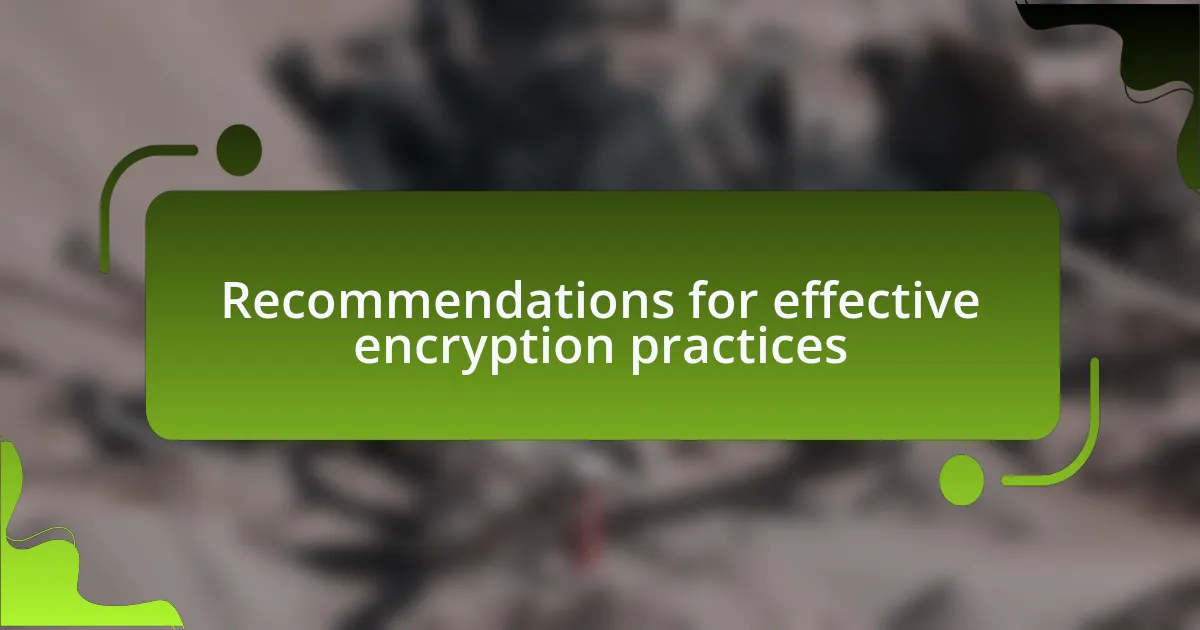
Recommendations for effective encryption practices
When it comes to effective encryption practices, one recommendation I always emphasize is the importance of choosing strong, complex passwords for encryption keys. I remember a time when a colleague thought a simple password would suffice, only to find it easily compromised. It’s a stark reminder that the strength of your encryption is only as good as the key protecting it. Why risk your entire operation over something as simple as a weak password?
Regularly updating encryption protocols is another crucial practice. In my experience, I have seen many operators rely on outdated systems, thinking they are secure because they worked in the past. However, cybersecurity is a constantly evolving landscape, and keeping up to date can be the difference between security and exposure. Isn’t it worth a little extra effort to ensure you’re on the cutting edge of protection?
Lastly, consider implementing encryption at multiple levels. I’ve learned that protecting data in transit and at rest adds layers of security. For instance, I’ve witnessed firsthand the benefits of encrypting not just stored personal information but also the data exchanged during transactions. This dual-layered approach can significantly reduce the risks associated with data leaks. Doesn’t it feel reassuring to know you’re taking every possible precaution?